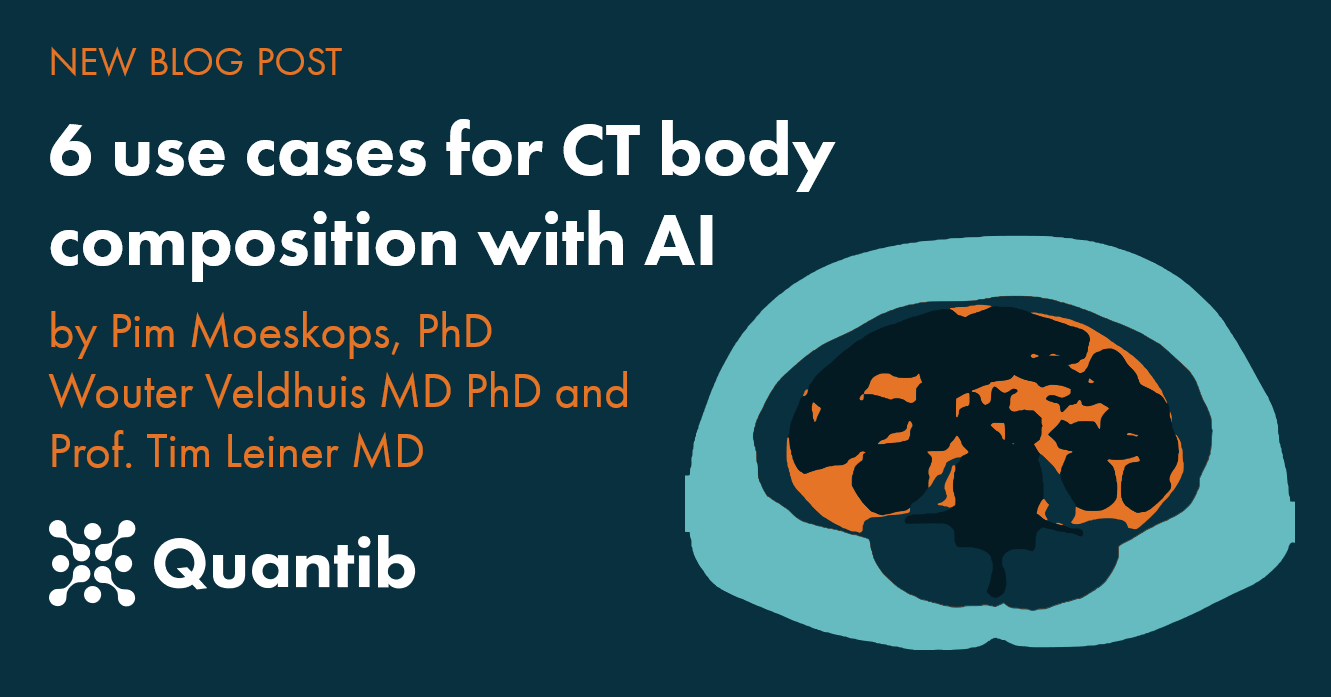We are proud to announce that we officially started the consortium "Precision Medicine for more Oxygen" (P4O2) that aims to fundamentally improve the early detection, prevention, and treatment of lung disease. This 14.5 million Euros public-private partnership with 27 partners is coordinated by prof. Anke-Hilse Maitland-van der Zee from Amsterdam UMC and is co-funded by Health~Holland. Quantib will work with leading researchers and experts on the association between body composition and lung disease.
Prevention is the key to healthy lungs
The quality of life for patients with chronic lung diseases like asthma, COPD, and lung cancer can- and should be improved. The Dutch consortium “Precision Medicine for more Oxygen” (P4O2) will start a research program to fundamentally improve the early detection, prevention and treatment of lung disease. Coordinated by Amsterdam UMC, the P4O2 consortium has a budget of over 14.5 million Euros and is co-funded by Topsector Life Sciences & Health (Health~Holland).
Approximately one in seven people develops lung disease, making it one of the leading causes of death worldwide (WHO). Lung disorders often have a major impact on patients and can lead to a severe loss in quality of life and work productivity. Healthy lungs have a complex defence mechanism against exposure to a harmful environment. However, over time and after repeated exposures, this mechanism can fail, leading to lung damage. The gradual accumulation of lung damage can lead to chronic disorders such as late-onset asthma, COPD, and lung cancer. Principal investigator professor Anke-Hilse Maitland – van der Zee of Amsterdam UMC states: “ We still do not fully understand why certain people develop lung disease and others do not. When chronic lung disorders are diagnosed people often have already accumulated so much damage and lost so much lung function that recovery is no longer possible. P4O2 aims to contribute to much earlier diagnosis, limiting lung damage and improving quality of life.”
Air pollution
The P4O2 consortium explores the factors which may increase the risk for chronic lung diseases in healthy subjects, people who survived Covid-19 infection, and in patients with COPD. Researchers search for markers that might predict the development of lung disease in blood, nasal swabs, and exhaled breath even before the disease manifests. There will also be attention paid to medication and other treatments with the potential to repair damage, thereby altering the course from early lung damage to chronic lung disease. Companies within the consortium will use innovative imaging analysis techniques and artificial intelligence to define signals of early lung damage. Furthermore, the living environment of the participants will be taken into account. Maitland: “One of the consortium-partners develops devices that measure air quality. Those devices can be installed on the participants’ bike and allow us to measure people’s exposure to air pollution.”
Influence of lifestyle and the environment
A group of the study participants will receive counselling on dietary intake, physical exercise, and smoking to evaluate whether such advice can reduce the risk for lung disease. Innovative cell models that mimic the complex lung environment will be developed in the lab, allowing researchers to study the influence of the environment and lifestyle factors (like air pollution and cigarette smoke, but also metabolic factors originating from muscle- and adipose tissue) on cellular damage. Maitland: “The strength of the P4O2 consortium is the multidisciplinary collaboration. By combining many different areas of expertise and big-data analyses, we can really make a difference. Chronic lung patients deserve a better life.”
About the consortium
The consortium includes top researchers, private partners, and patient representatives who aim to stimulate an internationally leading position in lung research for the Netherlands. Partners and sponsors are Amsterdam UMC, Leiden University Medical Center, UMC Groningen, UMC Utrecht, Utrecht University, Maastricht University, Maastricht UMC+, TNO, Aparito, Boehringer-Ingelheim, Breathomix, Clear, Fluidda, MonitAir, Ncardia, Nutricia, Ortec Logiqcare, Philips, Quantib-U, RespiQ, Roche, Smartfish, SODAQ, Thirona, TopMD, Lung Alliance Netherlands (LAN), and the Lung Foundation Netherlands (Longfonds). The consortium is sponsored by Novartis and is co-funded by the PPP Allowance made available by Health~Holland, Top Sector Life Sciences & Health, to stimulate public-private partnerships. P4O2 is part of the Dutch National Programme for Respiratory Research (NPL) that was developed by the Netherlands Respiratory Society (NRS) in collaboration with other lung associations, specialists and companies. More information is available at www.p4o2.org and via nrs@nrs-science.nl
About the Quantib
Quantib’s AI radiology solutions enable faster and more accurate diagnosis by quickly identifying abnormalities, supporting adequate and timely patient care. Using state-of-the-art artificial intelligence techniques, Quantib’s software advances the diagnostic pathway by providing clinically certified solutions related to neurodegeneration, prostate cancer, breast cancer, body composition and many more.
Interested to try out AI-powered body composition measurements on your own CT data? Get in touch!
